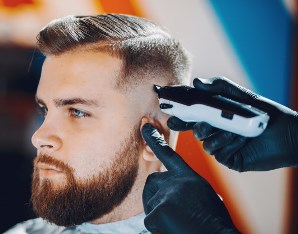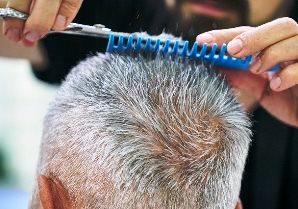How to Choose the Best Barber Training Program Near Kihei Hawaii
 Now that you have made a decision to enroll in a barber school near Kihei HI, the process starts to find and enroll in the ideal school. It's essential that the program you pick not only provides the appropriate education for the specialty you have chosen, but also prepares you for passing the licensing exam. When you start your initial search, you may be somewhat puzzled about the distinction between beauty schools and cosmetology schools, which both may offer barbering programs. Well don't be, because the titles are essentially interchangeable and both relate to the same kind of school. We'll discuss a bit more concerning that in the next segment. If you plan on commuting to classes you will need to choose a school that is within driving distance of your Kihei residence. Tuition will also be an important consideration when assessing prospective barber schools. Just remember that because a school is the closest or the least expensive it's not automatically the best choice. There are several other considerations that you should weigh when reviewing schools, for example their reputation and accreditation. We will examine what questions you should ask concerning the barber colleges you are looking at later in this article. Before we do, let's talk a little bit about what barbering is and why you may want to become a barber.
Now that you have made a decision to enroll in a barber school near Kihei HI, the process starts to find and enroll in the ideal school. It's essential that the program you pick not only provides the appropriate education for the specialty you have chosen, but also prepares you for passing the licensing exam. When you start your initial search, you may be somewhat puzzled about the distinction between beauty schools and cosmetology schools, which both may offer barbering programs. Well don't be, because the titles are essentially interchangeable and both relate to the same kind of school. We'll discuss a bit more concerning that in the next segment. If you plan on commuting to classes you will need to choose a school that is within driving distance of your Kihei residence. Tuition will also be an important consideration when assessing prospective barber schools. Just remember that because a school is the closest or the least expensive it's not automatically the best choice. There are several other considerations that you should weigh when reviewing schools, for example their reputation and accreditation. We will examine what questions you should ask concerning the barber colleges you are looking at later in this article. Before we do, let's talk a little bit about what barbering is and why you may want to become a barber.
Why Become a Barber?
A barber is a professional who cuts, trims, and styles hair for primarily male clients, though many women with shorter hairstyles opt to go to these professionals too. Most barbers also provide facial hair maintenance, custom shaves and other men's grooming services. The goal of a barber is to make each client feel comfortable and at ease while their hair is being cut or styled. The barber also seeks to ensure that the client is happy with his or her hairstyle, length and color or his new facial hair style. They usually use tools such as scissors, clippers, razors, and combs Barbers may also provide other services such as applying lotions, shampooing, styling, coloring hair, and singeing. In addition, a barber may perform massage services for the scalp, neck, and face. Finally, barbers will typically bill the client, accept payment and tips and finalize the sale. They may also sell the client products such as shampoo, lotions, or tonics that will meet their styling, grooming and maintenance needs between appointments. They will clean their work area and tools according to the state's safety and sanitation requirements after each appointment.
What to Ask Barber Colleges
 Below is a list of questions that you should research for any barber college you are considering. As we have previously discussed, the location of the school relative to your Kihei HI home, in addition to the expense of tuition, will undoubtedly be your initial qualifiers. Whether you want to pursue a certificate, diploma or a degree will no doubt be next on your list. But once you have reduced your school choices based on those preliminary qualifications, there are additional factors that you should research and consider before enrolling in a barber school. Below we have compiled several of those additional questions that you need to ask every school before making a final determination.
Below is a list of questions that you should research for any barber college you are considering. As we have previously discussed, the location of the school relative to your Kihei HI home, in addition to the expense of tuition, will undoubtedly be your initial qualifiers. Whether you want to pursue a certificate, diploma or a degree will no doubt be next on your list. But once you have reduced your school choices based on those preliminary qualifications, there are additional factors that you should research and consider before enrolling in a barber school. Below we have compiled several of those additional questions that you need to ask every school before making a final determination.
Is the Barber School Accredited? It's essential to make certain that the barber training program you select is accredited. The accreditation should be by a U.S. Department of Education acknowledged local or national organization, such as the National Accrediting Commission for Cosmetology Arts & Sciences (NACCAS). Programs accredited by the NACCAS must measure up to their high standards ensuring a quality curriculum and education. Accreditation may also be important for getting student loans or financial aid, which often are not available in Kihei HI for non- accredited schools. It's also a criteria for licensing in many states that the training be accredited. And as a final benefit, many businesses will not employ recent graduates of non-accredited schools, or might look more favorably upon those with accredited training.
Does the School have an Excellent Reputation? Every barber college that you are seriously considering should have a good to excellent reputation within the industry. Being accredited is an excellent starting point. Next, ask the schools for testimonials from their network of employers where they have referred their students. Confirm that the schools have high job placement rates, signifying that their students are highly demanded. Visit rating services for reviews along with the school's accrediting organizations. If you have any connections with Kihei HI barber shop owners or managers, or someone working in the industry, ask them if they are acquainted with the schools you are considering. They might even be able to recommend others that you had not considered. And finally, consult the Hawaii school licensing authority to see if there have been any grievances filed or if the schools are in total compliance.
What’s the School’s Focus? A number of cosmetology schools offer programs that are expansive in nature, concentrating on all facets of cosmetology. Others are more focused, providing training in a specific specialty, for instance barbering. Schools that offer degree programs frequently expand into a management and marketing curriculum. So it's essential that you enroll in a school that focuses on your area of interest. Since your objective is to be trained as a barber, make certain that the school you enroll in is accredited and well regarded for that program. If your aspiration is to start a barber shop in Kihei HI, then you need to enroll in a degree program that will teach you how to be an owner/operator. Picking a highly regarded school with a weak program in barbering will not deliver the training you need.
Is Any Live Training Provided? Learning and refining barbering skills and techniques demands plenty of practice on volunteers. Ask how much live, hands-on training is furnished in the barber classes you will be attending. A number of schools have shops on campus that allow students to practice their growing talents on real people. If a Kihei HI barber school provides minimal or no scheduled live training, but rather relies heavily on the use of mannequins, it might not be the best option for acquiring your skills. Therefore look for alternate schools that furnish this kind of training.
Does the School have a Job Placement Program? When a student graduates from a barber school, it's essential that she or he receives support in landing that first job. Job placement programs are an important part of that process. Schools that offer aid maintain relationships with area businesses that are looking for qualified graduates available for hiring. Check that the schools you are considering have job placement programs and find out which Kihei HI area shops and businesses they refer students to. Also, ask what their job placement rates are. Higher rates not only verify that they have extensive networks of employers, but that their programs are highly respected as well.
Is Financial Assistance Offered? Many barber schools offer financial aid or student loan assistance for their students. Check if the schools you are reviewing have a financial aid department. Talk to a counselor and learn what student loans or grants you might get approved for. If the school belongs to the American Association of Cosmetology Schools (AACS), it will have scholarships accessible to students as well. If a school meets all of your other qualifications with the exception of expense, do not discard it as an alternative until you learn what financial assistance may be offered in Kihei HI.
How to Train to Be a Barber in Kihei
Choose in the Right Kihei Barber College
Choosing and enrolling in the ideal barber training program is important to obtain the appropriate training to become a licensed specialist. Be sure to ask all the questions that you require in order to feel confident about your decision. Make sure to compile all of the information you receive from the barber school admissions departments, prioritize what matters the most to you, and then employ that information to compare schools. A reasonable beginning in your due diligence procedure is to make sure that the institution and program you decide on are accredited and have impressive reputations within the profession. If you begin with that foundation, and answer the additional questions presented in this article, you will be able to reduce your list of schools so that you can make the ideal choice. Once you graduate and pass your licensing test, you will be confident that you are prepared to launch your new career as a professional barber in Kihei Hawaii.
